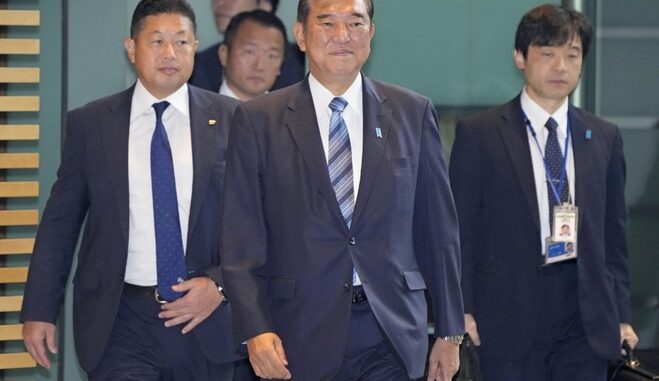
Prime Minister Shigeru Ishiba is poised to retain his premiership in a parliamentary vote on Monday and form a Cabinet, as a four-day special session begins following last month’s general election that stripped the ruling bloc of majority control in the powerful House of Representatives.
The vote to select a prime minister, which must be held following a general election, is expected to proceed to a runoff for the first time in three decades. Ishiba who heads the Liberal Democratic Party is set to compete with Yoshihiko Noda, leader of the major opposition Constitutional Democratic Party of Japan.
Neither the LDP nor the CDPJ has an outright majority in the 465-member lower house. But Ishiba is expected to secure more votes than Noda and remain in office because the candidate who gets the most votes in the runoff will be the winner.
Before the vote in parliament, Ishiba’s Cabinet members resigned en masse.
The prospect of a minority government means Ishiba’s LDP and its coalition partner, the Komeito party, need to heed more to demands from the opposition bloc that has been emboldened since the Oct. 27 election.
The CDPJ has an increased presence in the lower chamber and the same goes for the Democratic Party for the People, which has been courted by both sides of the aisle, with its seats quadrupling from before the election.
DPP leader Yuichiro Tamaki has said his fellow party members will vote for him, a move that would split the opposition vote and benefit Ishiba.
However, Tamaki said shortly before the start of the parliamentary session that he would consult with his fellow lawmakers after a magazine report came out alleging that he had an extramarital affair. He admitted that the report is mostly accurate.
In the run-up to the parliamentary session, the ruling coalition has signaled its willingness to work with the DPP and coordinate their policies, a critical step toward ensuring a stable government.
Ishiba held talks with Tamaki and Noda separately before the opening of the parliamentary session.
“I will take a sincere approach to all parties,” Ishiba told reporters. “The important point is to make sure that Japan is a peaceful nation and people’s livelihoods improve. We are on the same page on this with the DPP and the CDPJ.”
The opposition camp is expected to ramp up pressure on Ishiba to push for drastic political reforms, as the LDP’s defeat in the election was partly attributed to its failure to restore voter trust following the ruling party’s inappropriate handling of political funds.
Ishiba, who took office in October, is expected to make minor changes to the lineup of his Cabinet this time, mostly replacing those who lost their seats in the election.
Former senior vice foreign minister Keisuke Suzuki will be named the country’s new justice minister, and Taku Eto will again serve as farm minister. Hiromasa Nakano, a Komeito lawmaker, will assume the post of land minister, in place of Tetsuo Saito, who became Komeito chief.


Be the first to comment